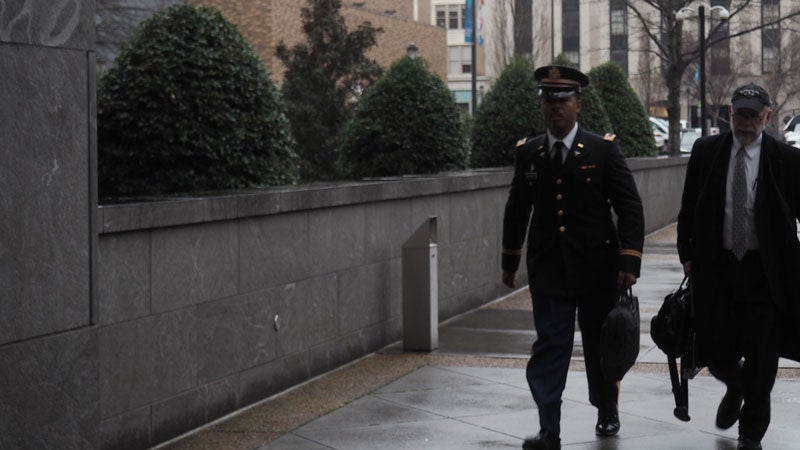Appellate judges hear National Guardsman’s request for new trial
Published 7:06 pm Tuesday, March 19, 2024

- Virginia National Guard 1st Lt. Caron Nazario with Thomas Roberts, co-counsel to his attorney, Jonathan Arthur (File photo)
When Virginia National Guard 1st Lt. Caron Nazario saw flashing blue lights on Windsor Police Officer Daniel Crocker’s patrol car three years ago, Nazario slowed to 18 mph but continued driving a mile down Route 460 through Windsor before stopping at a BP gas station.
Nazario’s attorney, Jonathan Arthur, and Crocker’s attorney, Anne Lahren, each referenced the low-speed pursuit in their March 19 arguments to a panel of three appellate court judges on the question of whether Nazario’s lawsuit against Crocker and ex-officer Joe Gutierrez warrants a new trial.
To grant a new trial, at least two of the three judges must agree one is warranted.
Nazario had sought more than $1 million in damages from Crocker and Gutierrez, the latter of whom was fired in 2021 after videos of Gutierrez pepper-spraying Nazario during the Dec. 5, 2020, traffic stop went viral online and sparked accusations of racism. A Richmond jury largely sided with the officers last year, awarding Nazario only $3,685 after finding Gutierrez liable for assault – but not battery – and Crocker liable only for having removed a firearm from Nazario’s car.
Arthur argues the jury’s minimal award was the result of U.S. District Court Judge Roderick Young having “erred” in granting Crocker and Gutierrez pretrial qualified immunity from Nazario’s excessive-force allegations.
Young had granted summary judgment, which allows a judge to dismiss part or all of a lawsuit’s claims before the matter reaches a jury, roughly five months ahead of the 2023 trial. Arthur maintains the minute and 40 seconds it took Nazario to pull over would not have justified a charge of eluding police, despite Young’s ruling and jury instruction to the contrary. Young also ruled pretrial that Nazario’s subsequent noncompliance with the officers’ conflicting commands to exit his vehicle and keep his hands outside the car’s window would have justified a charge of obstructing justice.
Lahren, however, maintains that both rulings were proper. Nazario, who testified at last year’s trial that he had been looking for a well-lighted place to stop, had passed several such places before arriving at the BP. Gutierrez’s lawyer, Jessica Swaugger, allowed Lahren to speak for both officers.
Both officers had exited their patrol cars with guns drawn after Crocker drew Gutierrez to the scene by reporting a “felony traffic stop” to dispatchers.
Under questioning by Appellate Judge Allison Rushing, Arthur admitted Crocker had cause to pull Nazario over for the expired, temporary New York license plate obscured behind his vehicle’s tinted rear window, and further acknowledged that Crocker may have had “reasonable suspicion” when the guardsman didn’t immediately pull over. Rushing is the newest judge on the panel, having been nominated in 2018 by former President Donald Trump and confirmed by the U.S. Senate in 2019.
Arthur, however, held up a tense exchange between Gutierrez and Nazario as evidence of when the traffic stop became unreasonable.
Footage from Gutierrez’s body camera and Nazario’s cellphone recorded the guardsman repeatedly asking the officers for an explanation for the stop while the two were shouting their conflicting commands at him, until Gutierrez at one point tells Nazario he’s “fixin’ to ride the lightning” and “should be afraid” to get out.
“No reasonable officer says, ‘Get out of the car, but by the way you should be terrified to do that,’ ” Arthur said.
The “ride the lightning” remark struck a chord with Appellate Judge Stephanie Thacker, who was nominated to the bench by former President Barack Obama in 2011 and confirmed by the Senate in 2012. Thacker said she too, as Nazario had contended during last year’s trial, understood the phrase to refer to an execution by electric chair. Gutierrez, at last year’s trial, said he was referring to a taser.
The fact that Nazario slowed down is also “not adding up for me on the eluding,” Thacker said.
Appellate Judge Robert King, who was nominated to the bench by former President Bill Clinton in 1998 and confirmed by the Senate the same year, also seemed open to Arthur’s arguments. He noted Crocker’s and Gutierrez’s commands to Nazario “absolutely are conflicting” when viewed “in the light most favorable” to the guardsman.
Rushing, however, was skeptical of Arthur’s assertion that a 1-mile drive didn’t constitute eluding and asked whether five or 10 miles would have met the threshold. She also asked whether overturning Young’s ruling on eluding but upholding his decision on obstruction would have any likely impact if a new trial were granted.
The panel could take weeks or even months to issue a written ruling, and may overturn one, both or neither of Young’s pretrial rulings.





